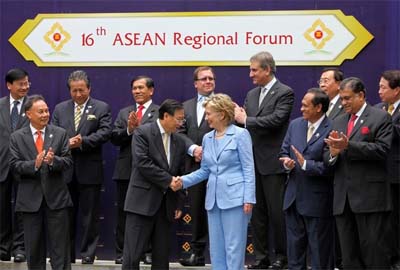ARF’s roots date back to January 1992. Here, at the fourth summit meeting, the leaders of ASEAN decided that the Post-Ministerial Conferences (between ASEAN foreign ministers and their counterparts from ASEAN’s Dialogue Partners) should be used for ‘intensified’ dialogues on ‘political and security matters’.
Following this, senior foreign ministry officials of ASEAN and its Dialogue Partners talked about how to carry out the ASEAN leaders’ directive. It quickly became clear that no real discussion of ‘political and security matters’ in the Asia Pacific was possible without the participation of China, Russia or Vietnam. Thus, in July 1994, the foreign ministers of the then-six ASEAN countries (Brunei, Indonesia, Malaysia, the Philippines, Singapore and Thailand) and their Dialogue Partners, then seven (Australia, Canada, the European Union, Japan, South Korea, New Zealand and the United States), together with ASEAN’s observers (Papua New Guinea, Laos and Vietnam) and its ‘consultative partners’ (China and Russia) gathered in Bangkok in the first ministerial meeting of the ASEAN Regional Forum.
Other countries took part in the Forum as they became either ASEAN members (Myanmar and Cambodia, as well as Vietnam and Laos) or Dialogue Partners (India, China and Russia were conferred this status in 1996). Papua New Guinea has remained an ASEAN observer and a participant in the ARF. Other states ASEAN considered could contribute to the peace and stability of the Asia Pacific were later added to the ARF participants — Mongolia in 1998, North Korea in 2000, Pakistan in 2004, Timor-Leste in 2005, and in the next two years Bangladesh and Sri Lanka.
Thus, today, the ARF has 27 participants, and has become a unique regional forum on regional political and security issues. At ARF, rival states, in the spirit of ASEAN’s stance of being friend to all and enemy to none, sit side by side — China and Japan, North and South Korea or India and Pakistan, to name a few.
A key issue at this year’s Forum in Bali will be the South China Sea territorial disputes. Dialogue here has been notably unconstructive. For example, the foreign minister of the Philippines, a claimant to much of the Spratlys in the South China Sea, was reported to have asked China to join the Philippines in submitting the dispute between them to the International Tribunal for the Law of the Sea in Hamburg. He claimed to have received no response.
Analysts will be closely watching US Secretary of State Hillary Clinton’s actions. Clinton is expected to reiterate Washington’s fundamental position of not taking sides in jurisdictional issues related to the South China Sea, and America’s interest in peace, stability and freedom of navigation in the area. Her statement on the disputes — and whether it is perceived as more or less assertive than her remarks last year — will be thoroughly analysed.
There will also be great interest in how China’s foreign minister, Yang Jiechi, responds. China is expected to insist that the conflicting claims to all or part of the South China Sea are a bilateral matter between the claimants. In earlier ARF ministerial meetings, China has demanded that the Sea be kept out of formal ARF discussions.
At the time of the meeting, Thailand will still be transitioning between governments following the 3 July elections. The Thai representative is expected to brief the ARF on the situation in and foreign policy of Thailand, including its border conflict with Cambodia. The Cambodian foreign minister is counted upon to respond.
The subject of Myanmar is also bound to come up, including developments since the new government’s assumption of office, the release from house arrest of Daw Aung San Suu Kyi, and the direction in which Myanmar is going. Specific questions could pertain to Myanmar’s proposal to assume the ASEAN chairmanship in 2014. Less well-known is Myanmar’s 2012-scheduled takeover of coordinator country for ASEAN’s dialogue relations with the US. Related to these are signs of any shift in the Western sanctions on Myanmar, something that ARF officials and other observers will be watching closely.
Some ASEAN countries resent ARF’s focus on certain states in Asia but not on the behaviour of Western governments elsewhere. In this light, discussions might be steered towards Western actions with respect to the ‘Arab Spring’, Afghanistan, Iraq and Israel-Palestine.
There is also the usual ARF Chairman’s Statement. As this is negotiated beforehand, surprises here are unlikely, and the Statement will contain remarks or endorsements of reports of activities throughout the year. Still, there is much to comment upon. And the political and strategic challenges facing this year’s foreign ministers at ASEAN Regional Forum are difficult. With the future stability of the region remaining far from certain, the events of this gathering will be scrutinised for some time to come.
Rodolfo C Severino, a former ASEAN Secretary-General, is head of the ASEAN Studies Centre at the Institute of Southeast Asian Studies, Singapore.

